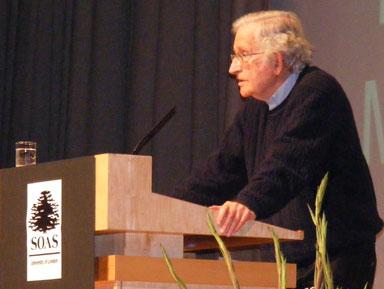 Noam Chomsky gave a talk in London last week in which he explained how protests against the Iraq War actually had a positive effect:
Noam Chomsky gave a talk in London last week in which he explained how protests against the Iraq War actually had a positive effect:
“There is a lot of comparison between opposition to the Iraq war with opposition to the Vietnam war, but people tend to forget that at first there was almost no opposition to the Vietnam war,” said Chomsky.
“In the Iraq war, there were massive international protests before it officially started… and it had an effect. The United Sates could not use the tactics used in Vietnam: there was no saturation bombing by B52s, so there was no chemical warfare – (the Iraq war was) horrible enough, but it could have been a lot worse,” he said.
“And furthermore, the Bush administration had to back down on its war aims, step by step,” he added.
“It had to allow elections, which it did not want to do: mainly a victory for non-Iraqi protests. They could kill insurgents; they couldn’t deal hundreds of thousands of people in the streets. Their hands were tied by the domestic constraints. They finally had to abandon – officially at least – virtually all the war aims,” said Chomsky.
“As late as November 2007, the US was still insisting that the ‘Status of Forces Agreement’ allow for an indefinite US military presence and privileged access to Iraq’s resources by US investors – well they didn’t get that on paper at least. They had to back down. OK, Iraq is a horror story but it could have been a lot worse,” he said
“So yes, protests can do something. When there is no protest and no attention, a power just goes wild, just like in Cambodia and northern Louse,” he added.
Not only was this analysis surprising coming from Chomsky—as opposed to, say, Howard Zinn—but it is just surprising in general. When it comes to dissecting the opposition to the Iraq War, one tends to hear more about the way in which it fizzled out after the invasion. While that’s still worthy of despair, this shows that we shouldn’t write off the power of protest, no matter how small or scattered.

bryan, chomsky has been saying similar in talks and interviews for several years. i think he’s right. doesn’t mean we don’t have a lot more to do, but it’s not an all or nothing proposition.
thanks for this post and link (love the blog although i don’t comment much).
I’m not sure I’d necessarily go so far as to credit the protests very much there. There were a lot of other forces involved—I suspect a lot of them were bureaucratic ones within the State Department and the Pentagon about how to fight a war while winning “hearts and minds.” And as for the charade of democracy and elections we’ve established in Iraq, that’s pretty much neo-conservative ideology at work. The war aims were backed down as much by the realities on the ground in Iraq (intractable civil war, etc.) than by any internal dissent at home.
I still find the most persuasive (and most disturbing) analysis of the protests to be from Slavoj Zizek in the London Review of Books:
In retrospect, I suspect that one of the things that made the protests so ineffectual might have been how much they were a purely popular movement, one that was too aloof from getting embroiled in the messiness of Washington politics. Doing so makes for a good demonstration, but ultimately, it left the war resolution free to pass the Senate 77/23 and the House 297/133. Those numbers should be seared in our memories! We utterly failed to persuade elected representatives that they would lose their jobs if they voted for a pointless war.
In that same article, I might add, Zizek puts nicely the alternative by which we might avoid repeating the mistakes of 2003:
Interesting food for thought. Not sure I agree with Chomsky, although I think the war protests were an important part of the societal drum beat that eventually led to Bush’s downfall and Obama’s election.